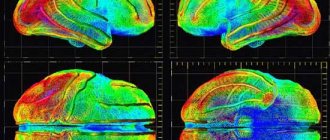Medical information is reliable Checked by Shaidullin Renat Flyurovich
Dementia is a common companion for older people. This is a severe progressive disease that brings significant discomfort to everyday life. The patient almost always does not realize what is happening to him. All concerns related to everyday life and other areas of the patient’s life fall on his loved ones. An unhealthy person needs round-the-clock care; he cannot care for himself. This is a disease whose development can be slowed down by undergoing regular treatment at Dr. Isaev’s Clinic. We use modern recovery methods, bringing back to life even seriously ill patients who were considered hopeless in other medical institutions.
Dementia in older people
Translated from Latin, the word means “dementia.” The main reason is organic damage to the brain, leading to dysfunction of higher nervous activity. The patient's mental abilities decrease, he cannot perform basic calculations, practical skills and knowledge are lost, and it becomes impossible to acquire new ones.
Our clinic specialists are guided by a complete medical history in the treatment of dementia. The clinical picture depends on the location of the brain lesion, its extent, the prerequisites for the development of the disease, age and general health.
The danger lies in the persistence of the disorder; it only progresses over time. Initially, the defeat affects intellectual activity, then disturbances in the emotional-volitional sphere become noticeable. The final stage is the complete and irreversible disintegration of personality.
When an elderly relative ceases to be adequate: clinical picture
Many people mistake the disease for ordinary whims, without seeking help from specialists. In most cases, it develops harmlessly. Sometimes a person tells his neighbors or friends that they don’t feed him at home, they try to harm him, or release dangerous gases into his home. The disease progresses rapidly, gradually the elderly no longer always recognize their relatives, begin to blame them for situations that did not occur (for example, theft, violence), and bring unnecessary garbage from the landfill. Some believe that a person does this on purpose, simply to mock his loved ones.
Due to the destructive effect on the brain, the patient does not understand what he is doing. He is not able to fully assimilate and process the information received, and is hypersensitive to any criticism (reacts sharply to all comments). Relatives need to be patient, be attentive, and communicate in calm tones. When a patient feels aggression towards him, he begins to consider his close people as enemies and communicate with them accordingly.
The exact clinical picture depends on the cause that provoked the disease and the location of the affected part. With a mild degree, a person remains critical of his own condition and does not lose the ability to self-care. Over time, the situation worsens, the clinical picture becomes more pronounced, the following are noted:
- cognitive impairment. A person cannot say exactly what day, month and year it is. Episodes of loss in space occur. The patient simply forgets who he is, where he is and where he is going. Speech in any form (oral and written) is perceived with great difficulty. Confusion of thinking occurs - the thread of the conversation is lost, by the end of the sentence the patient does not remember what happened at the beginning;
- motor disorders. Characterized by a persistent gait and a tendency to fall. Due to disruption of the normal functioning of muscles and ligaments, difficulties with pronunciation may occur;
- violation of neatness skills. The patient does not care what he looks like, does not wash his clothes, does not take a shower.
Types of dementia
Experts classify the disease into three areas. They are distinguished by the extent and selectivity of damage to the body:
- Atrophic (Alzheimer's) - occur due to malfunctions of the nervous system.
- Vascular – acts as a concomitant disease, the primary source of which is impaired blood circulation in the brain.
- Mixed - combines the features of the vascular and atrophic types.
According to statistics, atrophic type dementia is more common in older women than in men.
The classification of dementia depending on the location of the brain lesion is as follows:
- cortical - the cerebral cortex is primarily affected (Pick's disease or Alzheimer's disease);
- subcortical – pathology affects subcortical structures (Parkinson’s disease with neurological symptoms);
- cortical-subcortical – there are disturbances in both the cortex and subcortex;
- multifocal – damage to the nervous system in all parts.
There are lacunar and total dementia. In the first case, there is damage to the structures responsible for intellectual activity. A person cannot remember what happened to him 5 minutes ago, but at the same time he calmly reproduces in his memory the events of twenty years ago. His short-term memory suffers, and a number of associations are significantly impoverished. His intelligence fails, sometimes even simple things become inaccessible to understanding. The patient is critical of his condition and is aware of the problem. The emotional-volitional sphere is practically not affected; symptoms include increased sensitivity and tearfulness.
In the case of total dementia, the situation looks much more serious. This type of disease is accompanied by gross changes in the intellectual and emotional-volitional spheres. Life interests are lost irrevocably, moral values fade into the background, and there is no sense of shame for unseemly actions. Such patients cannot remain full-fledged members of society, as they are completely maladapted. Our clinic treats suicidal behavior and senile dementia using new, safe methods.
Signs of dementia
Regardless of what type of disease the patient has, the complex of clinical manifestations of the disease is almost the same. When you first notice signs of dementia, you must urgently consult a doctor in order to make an accurate diagnosis and draw up a treatment algorithm.
Alarm bells that the patient’s relatives should pay attention to are the following factors:
- Impairment of short-term and long-term memory. It manifests itself in the form of an inability to remember new information or reproduce the events of the past day or past years. Patients make every effort to activate their memory, but they fail.
- The patient cannot fully assimilate new information or acquire skills that he did not have before. These people lose the ability to learn, cannot remember the sequence of actions and lose touch with reality.
- Disorientation in space. A person easily gets lost in open areas; he does not remember his residential address and telephone number. Sometimes he cannot clearly answer the question what day and year it is. Such elderly people are often brought to the police by vigilant citizens. Only law enforcement agencies can figure out where an elderly person comes from and where to look for his relatives.
- There is no desire to learn something new, since this information cannot be processed by the brain at the same level.
- The critical attitude towards oneself and one’s actions is lost, the patient ceases to distinguish between what is bad and what is good. He falls into childhood, losing all the signs of an adult.
- There is no planning for the next days and months of your life. Patients with dementia live one day at a time.
The disease is getting worse every day, these manifestations are intensifying. New signs of dementia appear, even more destructive and dangerous.
Diagnosis of the disease
Suspicion of dementia is a good reason to see a doctor. This pathology is dealt with by a therapist, a neuropsychologist, a neuropathologist, a psychiatrist and a specialist who deals with diseases of the elderly. The diagnosis is made after interviewing the patient’s relatives and the patient himself. Important information is:
- age;
- characteristic signs;
- frequency of symptoms;
- time of onset of pathology.
A comprehensive neurological examination using modern equipment allows us to determine where the foci of pathology are located. The diagnosis is finally made only when symptoms are observed for six months and intensify over time.
A number of psychological tests are carried out to assess cognitive function. They make it clear at what level of consciousness the patient is. During testing the following is established:
- degree of orientation in space;
- features of attention;
- volume of short-term and long-term memory;
- thought processes (abstract, logical);
- the presence or absence of hallucinations, illusions;
- ability to think critically and plan.
Dementia causes
The main prerequisite for the occurrence of dementia is damage to the central nervous system. The degeneration of brain cells leads to the fact that the personality is gradually destroyed. With such lesions, the disease develops independently. There are a number of diseases in which senile dementia is one of the associated complications. Among them:
- alcohol abuse in the final stages;
- cerebral atherosclerosis;
- high blood pressure;
- malignant or benign formations of the central nervous system;
- strokes;
- trauma and mechanical damage to the brain;
- infectious, viral diseases (meningitis, encephalitis, HIV);
- renal and liver failure;
- dysfunction of the endocrine system;
- lupus erythematosus;
- complications due to hemodialysis;
- multiple sclerosis.
If the patient has immediate family members who have been diagnosed with dementia, this is an additional risk factor. Diabetes mellitus and obesity can also trigger the development of this disease.
Classification and causes of the disease
Senile dementia appears when there is organic damage to the brain (against the background of severe trauma or concomitant pathology). The most common cause of acquired dementia is Alzheimer's disease (occurs in approximately 65-70% of cases). About 15-20% are due to atherosclerosis and other severe cardiovascular diseases. Often there are two or more reasons at once. There are several factors that increase the likelihood of developing dementia. Among them:
- blood pressure surges;
- abnormalities of the endocrine system (diabetes mellitus);
- mental disorders;
- genetic predisposition;
- abuse of alcohol and tobacco products;
- traumatic brain injury;
- autoimmune diseases;
- old age (over 65 years).
Based on damage to specific areas of the brain, four types of dementia are distinguished. With cortical damage, the cerebral cortex is damaged. This often occurs in alcoholism and Alzheimer's disease. Subcortical affects subcortical structures, which leads to neurological disorders (in particular, tremors of the limbs and muscle stiffness). It is observed in patients suffering from Parkinson's disease and Huntington's disease. In the case of cortical-subcortical dementia, as the name implies, damage occurs to both the cortex and subcortical structures. It is typical for people who have been diagnosed with vascular diseases. With multifocal, multiple areas of necrosis and degeneration occur in several parts of the central nervous system.
Dementia symptoms
Dementia belongs to the category of diseases that do not simply go away and progress. Depending on the patient’s current socialization capabilities, three stages of pathology are distinguished. Each of them has its own specific set of symptoms.
- First stage. The patient already has noticeable intellectual impairments. There are complaints that he cannot remember events in his life and forgets his address. A critical attitude towards his condition remains, the person understands that he needs to see a doctor for professional help. Any household activity is carried out in full, self-service remains at a high level. Such patients follow the rules of hygiene, can cook their own food, and clean the house. At this stage, round-the-clock care is not yet required.
- Second stage. The development of the disease is accompanied by severe intellectual impairment. The person does not remember whether he turned off the gas or the iron, closed the doors and other things important in terms of safety. The patient does not realize the criticality of his situation; he does not believe that he is sick. There is a risk that older people with dementia may cause harm to themselves or others through carelessness, without malicious intent. They require regular care; leaving such a person alone is unsafe.
- Third stage. It is the most severe, characterized by complete collapse of personality. The symptoms of dementia are especially pronounced here. Usually such changes in the brain are irreversible. At this stage it is very difficult to stop the further development of dementia. Patients do not recognize their friends, family and loved ones. They cannot feed themselves and must be spoon-fed. Even if in rare cases hunger prompts them to search for food, older people cannot distinguish good foods from bad ones. They cannot maintain good hygiene, so they need constant care around the clock. The ability for logical thinking gradually fades away, they cannot connect two facts together. Verbal communication with others is reduced to zero; they are constantly in silence. The third stage is characterized by apathy and a depressed mood. There is no feeling of thirst or hunger; if the patient is not fed for a long time, he will not ask. Movement disorders lead to the fact that a person cannot perform the simplest movements - chew, swallow, walk. Unfortunately, this stage sooner or later leads to the death of the patient.
Staging and clinic
The clinical picture in most cases progresses slowly and the first stage of the pathology is extremely difficult to determine.
Relatives or a guardian may notice slight absent-mindedness, forgetfulness, and clumsiness, which is most often perceived as senile “senility.” Degrees of dementia
| Degree | Symptoms |
| 1 tbsp. – light | Work and social activities are disrupted. The patient retains skills for independent living and self-care. A person is able to observe the rules of personal hygiene, prepare food, and do cleaning. Self-criticism is relatively preserved. Forgetfulness occurs after newly received information, and there is a need to write down planned events on a piece of paper. Isolated cases of temporary loss of spatial orientation. Initial manifestations of insomnia. |
| 2 tbsp. – average | A quick change of mood occurs. Emotional lability in the form of tearfulness, hysteria or aggression is alarming, and therefore patients may end up seeing a psychotherapist or in an inpatient hospital at a psychoneurological dispensary. Problems arise with the selection of words, a forgotten word form is replaced by one that is close in meaning or completely unrelated to a specific conversation. The ability to write is lost. There is a reluctance to carry out hygiene measures and other self-care procedures. At the border of the transition from the second to the third degree, incoherent speech, muttering and manifestations of dissatisfaction are noticed for no apparent reason. |
| 3 tbsp. – heavy | Everyday activities are impossible. The patient needs outside supervision and help. There is often a lack of understanding of what is happening, information about what others are saying. Unable to give a clear answer. Short-term and long-term memory is completely lost. Patients are often bedridden and unable to control the urethral and anal sphincter. Due to involuntary urination and stool ejection, they need a disposable adult diaper. Problems with chewing and swallowing (dysphagia) appear, so parenteral nutrition is prescribed. |
The severe stage lasts on average about one and a half years. In most patients, death occurs within 6 months due to exhaustion, intoxication, dysfunction of internal organs, or sepsis.
Prevention of disease in old age
It is possible to prevent the development of dementia. Prevention measures are necessary in the early stages, without waiting for old age. Similar advice is given by specialists during the treatment of insanity. Doctors recommend taking care of your mental health after 40 years:
- It is necessary to control blood sugar levels, this will avoid the development of diabetes mellitus, against which dementia often develops. Blood vessels will be healthy and elastic until old age. This will have a positive effect on your well-being.
- Constant monitoring of blood pressure will help avoid stroke and myocardial infarction. It is important to periodically take tests to determine the amount of cholesterol in the blood to prevent the formation of cholesterol plaques on the inner walls of blood vessels and reduce the risk of blood clot formation and artery blockage.
- Bad habits, especially chronic alcoholism, often lead to senile dementia.
- Self-treatment of any mental disorders, even mild forms, is strictly prohibited. Very often, patients prescribe tranquilizers and antidepressants for long-term depression. All drugs aimed at suppressing brain activity can only be taken under the supervision of a doctor.
- Traumatic brain injuries are also becoming a risk factor. You need to protect yourself from various mechanical damage to the brain. If there has been a blow or fall in the past, it is necessary to undergo regular examinations with a therapist in order to prevent and develop the disease.
- Physical activity will help keep the circulatory system in good shape. Daily morning exercises, dancing, walking in the fresh air have a beneficial effect on the entire body.
- Positive emotions should become a habit. Frequent stress and neurosis can provoke changes in the cerebral cortex and nervous system, which complicates the treatment of dementia.
- Proper nutrition is the key to health. Your daily diet should include fish, meat, dairy products, and vegetables. It is necessary to avoid foods that contain preservatives, dyes, carcinogens and refractory fats.
- A proper sleep and rest routine will help keep your cardiovascular system in good shape. You need to sleep at least 8 hours a day.
- Training intellectual activity, meeting new people, learning foreign languages will help to delay as much as possible the moment when senile dementia begins to develop.
- Developmental exercises that train fine motor skills of the hands are very useful not only as a preventive measure, but also in the treatment of the first stage of dementia. Good for appliqué, handicrafts, drawing, modeling, assembling puzzles, and bead embroidery.
Borderline state before biological death
The terminal stage is characterized by the absence of manifestations of vital activity. There is indifference not only to the outside world, but also to loved ones (children, spouse and others). Physiological needs become completely uninteresting: absolute loss of appetite, uncontrolled urination and excretion of feces, walking in the fresh air.
Symptoms of impending death in dementia:
- the patient's condition as stupor (stunning);
- lack of response to appeal;
- concentrated urine – dark in color with an unpleasant odor;
- constipation due to the inability to form feces;
- Cold hands, feet, nose, ears to the touch are evidence of decreased blood microcirculation;
- miosis (constricted pupils).
A few days before death, in some cases, with weakened blood circulation and severe cachexia, dark spots are visible on the skin, resulting from tissue necrosis. The patient slowly enters a pre-agonal state of death. Patients with dementia suffer from impaired blood flow to the cerebral arteries before death. There is a decrease in blood pressure and an increase in heart rate. Uneven spontaneous breathing called Cheyne-Stokes breathing is observed.
The outcome of dementia is agony and biological death. The agonal state is characterized by a temporary improvement in overall well-being and restoration of the functioning of the cardiovascular and nervous systems. Before death, dementia seems to disappear, the patient comes to his senses and can speak clearly. The work of higher nervous activity is activated as a compensatory mechanism.
Dementia of the young: myth or reality
Although dementia is most often diagnosed in older people, the disease is often found in younger people. At this age, it is very difficult to determine the moment when dementia begins to develop. Lack of timely assistance complicates the disease. Most often, dementia in young people is a consequence of pathology of the nervous system or brain.
Among the reasons are:
- traumatic brain injuries;
- dysfunction of the thyroid gland;
- infectious viral diseases;
- alcoholism.
Chronic alcohol abuse causes vitamin B1 deficiency. This leads to difficulty in perceiving new information and often provokes memory lapses the morning after the feast.
Signs of dementia in young people are associated with the stage of pathology, as well as the intensity of the disease. Each of the three stages has its own specific features:
- Early stage. The disease can remain undetected for a long time. The person continues to go to work, communicate with relatives and friends. Pathology can be suspected by unhealthy forgetfulness, periodic loss of orientation in space and time.
- Middle stage. Symptoms of the early stages of dementia become more acute and worse. Previously acquired household and professional knowledge and skills are lost, and there is no opportunity to acquire new ones. A young man sometimes forgets the names of his friends and does not remember the events that happened yesterday. If he often asks the same questions without remembering the answers he received, this is a reason to urgently consult a doctor. The patient begins to walk aimlessly around the house and cannot find himself in any activity. At this stage, he already needs help with self-care. One of the most unpleasant symptoms is fecal and urinary incontinence. In order for a person with dementia to continue to live a normal life, he requires round-the-clock care.
- Late stage. This is the most difficult stage in the development of the disease, during which the first signs of personality disintegration are observed, and previous symptoms worsen. The person becomes completely passive, apathetic, and needs constant care. Memory and thought processes cease to function; the patient often does not remember his name or how old he is. Orientation in space is completely lost, speech and motor activity are practically absent.
About pathology
Dementia combines a number of clinical symptoms characteristic of decreased intellectual abilities. Patients lose the ability to remember, analyze and reproduce new information received. They perceive negative changes in life as the norm, and the ability to self-criticize decreases. In severe advanced cases of dementia, they cannot navigate their identity, space and time. It is difficult to recognize close relatives and dear people. The outcome of dementia is death.
Dementia and death are indirectly related to each other, because dementia is not the cause of death of the body. Patients can live a long time with proper care and hygiene standards. Life expectancy directly depends on the activity and course of the underlying disease, such as Alzheimer's disease, acute cerebrovascular accident (stroke), infectious brain damage, alcoholism or drug addiction.
Dementia treatment
Experts emphasize that treatment of dementia should only occur in a hospital setting. Self-selected methods of therapy are very dangerous; it is impossible for a non-specialist to calculate the dosage of the medicine and select it correctly. Hospitalization of a patient with dementia is the best way to care for a close relative.
A comprehensive examination of patients with dementia includes:
- the patient undergoing psychological tests;
- conversation with relatives to collect anamnesis of the disease;
- imaging diagnostic methods (CT, MRI, PET).
The doctor selects medications and determines their dosage. He explains to family how to distinguish the signs and symptoms of schizophrenia from senile dementia. Provides necessary explanations regarding the treatment regimen. Provides information about the rules of behavior with the patient. Explains the specifics of patient care. Informs about side effects from prescribed medications. The doctor also recommends periodic examinations in the hospital and at home.
The treatment regimen for dementia is selected individually; in Dr. Isaev’s Clinic there are no standard methods of treating patients. It depends on the stage of the disease, the reasons that caused it, and the general condition of the patient. For thinking disorders, some drugs are prescribed, for severe concomitant diseases of the nervous system - others.
Only round-the-clock monitoring of a person with dementia will help maintain his standard of living at a normal level. If the condition worsens, the doctor promptly adjusts the prescribed therapy regimen. Also in our clinic you can undergo treatment for apathy, which is a common accompaniment of dementia.
Forecast
The prognosis for dementia in bedridden patients is unfavorable. According to statistics, once a severe stage is diagnosed, on average, people die from dementia within 6-24 months. By creating the necessary conditions, proper care and prescribing adequate therapy, life can be extended by 2-4 years.
Life expectancy forecasts depend on the general condition of a person, the protective properties of the body and behavioral characteristics in society. Sometimes a patient can harm himself at an early stage, unaware of the danger: leaving the gas on, getting injured, wandering and going in an unknown direction.
Dementia treatment in Moscow reviews
When choosing a clinic for the treatment of dementia, many relatives of patients are afraid of poor-quality care or cruel treatment of a mentally retarded person. The fears are based on information about old-style state mental hospitals, the conditions of which did not stand up to criticism. On this page you will see reviews from our patients and their loved ones who have already undergone treatment for dementia. Their words will be the best confirmation of comfortable living conditions, good nutrition and proven methods of therapy for older people.
Questions and answers
When does alcohol-related dementia begin to develop?
Dementia due to the abuse of alcoholic beverages develops under conditions of prolonged use of alcohol - 10-15 years. The condition is aggravated by vascular pathology and liver diseases.
If a person periodically forgets the names of his relatives in old age, is this developing dementia or simply senile forgetfulness?
This condition is typical for older people. If there are no additional signs of dementia (decreased intelligence and disturbances in the emotional-volitional sphere), there is no need to worry. It is advisable to consult a family doctor or general practitioner.








